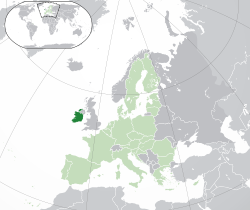Term: Republic of Ireland
**Historical Background**:
– Ireland was part of the United Kingdom from 1801 to 1922.
– The Great Famine from 1845 to 1849 led to a significant population decline.
– The Irish Parliamentary Party, led by Charles Stewart Parnell, advocated for Home Rule.
– The Parliament Act 1911 and Third Home Rule Act in 1914 marked progress towards Home Rule.
– Unionist movements, particularly strong in Ulster, opposed Home Rule.
– Third Home Rule Act was implemented in 1914 but suspended until after WWI.
– Irish National Volunteers supported the UK in WWI.
– Irish Volunteers launched the 1916 Easter Rising against British rule.
– The Anglo-Irish Treaty was signed in 1921, creating the Irish Free State.
**Political and Government Structure**:
– Ireland is a unitary, parliamentary republic.
– The Oireachtas is the legislature, consisting of Dáil Éireann and Seanad Éireann.
– The President serves as the head of state with some powers.
– The Taoiseach, appointed by the President, is the head of government.
– The President of Ireland is the head of state and serves a seven-year term.
– The government is limited to fifteen members, with specific requirements for key positions.
– The current government is a coalition of Fianna Fáil, Fine Gael, and the Green Party.
**Geography and Climate**:
– Ireland is located in north-western Europe.
– It consists of 26 of the 32 counties of the island of Ireland.
– Dublin is the capital and largest city of Ireland.
– Ireland covers about five-sixths of the island of Ireland.
– Bounded by the Atlantic Ocean to the north and west.
– The highest point is Carrauntoohil in the MacGillycuddys Reeks.
– Ireland has a temperate oceanic climate influenced by the Atlantic Ocean and Gulf Stream.
**Economy and Foreign Relations**:
– Ireland is a developed country with high quality of life.
– It ranks among the top ten wealthiest countries in the world in terms of GDP and GNI per capita.
– Ireland is a member of the EU, Council of Europe, and OECD.
– Dublin is a major financial hub in Europe.
– Ireland has been a member state of the European Union since 1973.
– The EU has a significant influence on Ireland’s foreign relations and policies.
– Ireland ranks high in GDP per capita and GNI per capita.
**Military and Economic Policies**:
– Ireland is a neutral country with triple-lock rules for military participation in conflict zones.
– The Irish Defence Forces consist of the Army, Naval Service, Air Corps, and Reserve Defence Force.
– Ireland has high levels of public and private sector indebtedness.
– Ireland’s tax policy transformation began with the creation of a low-tax special economic zone in 1987.
– Multinational tax schemes in Ireland have distorted economic statistics.
Ireland (Irish: Éire [ˈeːɾʲə] ⓘ), also known as the Republic of Ireland (Poblacht na hÉireann), is a country in north-western Europe consisting of 26 of the 32 counties of the island of Ireland. The capital and largest city is Dublin, on the eastern side of the island. Around 2.1 million of the country's population of 5.15 million people reside in the Greater Dublin Area. The sovereign state shares its only land border with Northern Ireland, which is part of the United Kingdom. It is otherwise surrounded by the Atlantic Ocean, with the Celtic Sea to the south, St George's Channel to the south-east, and the Irish Sea to the east. It is a unitary, parliamentary republic. The legislature, the Oireachtas, consists of a lower house, Dáil Éireann; an upper house, Seanad Éireann; and an elected president (Uachtarán) who serves as the largely ceremonial head of state, but with some important powers and duties. The head of government is the Taoiseach (Prime Minister, literally "Chief"), who is elected by the Dáil and appointed by the President, who appoints other government ministers.
Ireland Éire (Irish) | |
|---|---|
| Anthem: Amhrán na bhFiann "The Soldiers' Song" | |
 Location of Ireland (dark green) – in Europe (green & dark grey) | |
| Capital and largest city | Dublin 53°20.65′N 6°16.05′W / 53.34417°N 6.26750°W53°N 8°W / 53°N 8°W |
| Official languages | |
| Ethnic groups (2022) |
|
| Religion (2022) |
|
| Demonym(s) | Irish |
| Government | Unitary parliamentary republic |
| Michael D. Higgins | |
| Simon Harris | |
• Tánaiste | Micheál Martin |
| Donal O'Donnell | |
| Legislature | Oireachtas |
| Seanad | |
| Dáil | |
| Independence from the United Kingdom | |
| 24 April 1916 | |
| 21 January 1919 | |
| 6 December 1921 | |
| 6 December 1922 | |
| 29 December 1937 | |
| 18 April 1949 | |
| Area | |
• Total | 70,273 km2 (27,133 sq mi) (118th) |
• Water (%) | 2.0% |
| Population | |
• 2022 estimate | |
• 2022 census | 5,149,139 |
• Density | 71.3/km2 (184.7/sq mi) (113th) |
| GDP (PPP) | 2023 estimate |
• Total | |
• Per capita | |
| GDP (nominal) | 2023 estimate |
• Total | |
• Per capita | |
| Gini (2022) | low |
| HDI (2022) | very high (7th) |
| Currency | Euro (€) (EUR) |
| Time zone | UTC (GMT) |
• Summer (DST) | UTC+1 (IST) |
| Date format | dd/mm/yyyy |
| Driving side | left |
| Calling code | +353 |
| ISO 3166 code | IE |
| Internet TLD | .ie |
The Irish Free State was created with Dominion status in 1922, following the Anglo-Irish Treaty. In 1937, a new constitution was adopted, in which the state was named "Ireland" and effectively became a republic, with an elected non-executive president. It was officially declared a republic in 1949, following the Republic of Ireland Act 1948. Ireland became a member of the United Nations in 1955. It joined the European Communities (EC), the predecessor of the European Union (EU), in 1973. The state had no formal relations with Northern Ireland for most of the 20th century, but the 1980s and 1990s saw the British and Irish governments working with Northern Irish parties to resolve the conflict that had become known as the Troubles. Since the signing of the Good Friday Agreement in 1998, the Irish government and Northern Irish government have co-operated on a number of policy areas under the North/South Ministerial Council created by the Agreement.
Ireland is a developed country with a quality of life that ranks amongst the highest in the world; after adjustments for inequality, the 2021 Human Development Index listing ranked it the sixth-highest in the world. It also ranks highly in healthcare, economic freedom, and freedom of the press. It is a member of the EU and a founding member of the Council of Europe and the OECD. The Irish government has followed a policy of military neutrality through non-alignment since before World War II, and the country is consequently not a member of NATO, although it is a member of Partnership for Peace and certain aspects of PESCO. Ireland's economy is advanced, with one of Europe's major financial hubs being centred around Dublin. It ranks among the top ten wealthiest countries in the world in terms of both GDP and GNI per capita. After joining the EC, the country's government enacted a series of liberal economic policies that helped to boost economic growth between 1995 and 2007, a time now often referred to as the Celtic Tiger period. A recession and reversal in growth then followed during the Great Recession, which was exacerbated by the bursting of the Irish property bubble.


